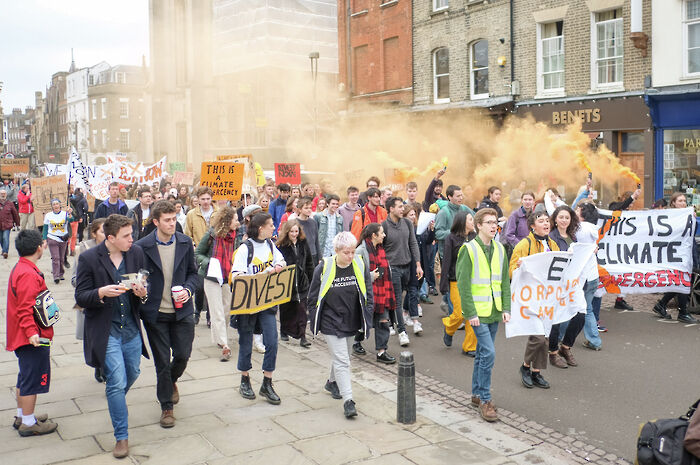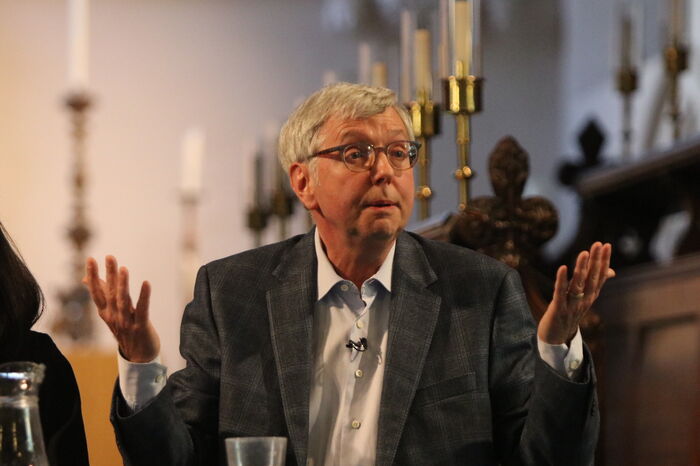This is our university; we must resist corporate interests
Following a Lent term packed with student-led activism, Angus Satow examines the implications this has had for the University management and the future of higher education

This is an extraordinary political moment in Cambridge, with the status quo disrupted on every level. Literally, of course, because of staff strike action and the occupation of Old Schools. But this last term has also been one of widespread revolt.
On pensions, University management are on the back foot, having begun the dispute firmly supporting defined contributions. After student-staff solidarity forced early concessions, and with pressure building, Vice-Chancellor Stephen Toope last week asked University Council “to accept greater risk and cost in the short-term”, before eventually coming out for (temporary) defined benefit shortly after the occupation began. With Old Schools occupied, Toope was forced to bow to the pressure and agree to an open meeting with students, while also reversing an earlier decision to dock staff pay.
On divestment, a leaked working group report showed the University is set to ignore both staff and students and refuse to divest from fossil fuels. In retaliation, hundreds of students and academics, whose 2017 decision at Regent House is being overridden, marched on Thursday in protest.
On housing, our ‘Cut the Rent’ campaign has seen hundreds of students mobilise against unfair living conditions and win. Magdalene and Robinson have seen major concessions following grassroots campaigns, with gains at Emmanuel and Newnham too.
These are not separate struggles. Rather, they all pit students and staff against an administration intent on running the University as a business. What we are seeing is a major crack emerging in the neoliberal vision of the University.
The pensions dispute is, of course, just another stage in the long-term project to marketise higher education. In the last few weeks, a clearer picture of the leading role of Cambridge and its colleges, alongside their counterparts in Oxford, in the attack on pensions has emerged, as detailed by LSE academic Michael Otsuka.
Their hope was to be free of the burden of smaller, poorer universities and colleges. Management wants, ultimately, to exit the scheme, and the valuation was the best way to do it – this is the true reason behind Stephen Toope’s suggestion of a Cambridge-specific scheme.
But when we say it was the University or the Colleges demanding less risk, who do we mean? Surely it is not the students who make up this institution, or the staff who supposedly govern it?
The enemy is an unaccountable financial bureaucracy which has trampled all over Cambridge’s veneer of democracy. Management has admitted that its submission to the UUK wasn’t agreed by University Council, but by unelected bureaucrats. Meanwhile several colleges, including King’s and St Catherine’s, have rolled back their bursars’ submissions, reasserting the right of fellows to decide policy at Governing Body. As with the UUK, a technocratic bureaucracy has overreached itself.
University management want Cambridge to be the Ivy League. They want out of a system in which many universities can charge £9,000, in which pension risk is shared collectively. Management know that both they and the University will do very well out of a market system, in which they will sit happily at the top, unconstrained by collectivity.
With state funding withheld, the University is desperate to squeeze what it can out of its staff and students.
One of the primary ways it is doing this is rent. The 2010 higher education reforms didn’t just hike fees, they slashed state funding. Consequently, universities are now run like rentier corporations, extracting the maximum amount possible from both their students and their estates, while reducing costs (e.g. staff pensions). The reforms brought the potential, with securitised debt, to fund massive, lucrative expansion projects. At the same time care would be taken to create a ‘porous membrane’ between business and research.

This is most visible in the £1 billion North-West Cambridge project, explicitly built with the private sector in mind. This lucrative new project – supposedly affordable rooms at Girton’s Swirles Court actually total up to £6,080 – is an important milestone in Cambridge’s aggressive, US-style expansion, as heralded by its £2 billion ‘Dear World fundraising campaign.
Once again, however, management has made an error of judgement. The ‘Cut the Rent’ campaign shows students are unwilling to serve as cash cows for colleges intent on squeezing them dry. A vision of housing justice, grounded in a commitment to access and welfare, is beginning to emerge. It must in time be extended beyond the confines of the University, to the town of Cambridge, as we seek to build a social university.
Of course, a social university demands something else: divestment from fossil fuels. Yet management have, from the outset of Zero Carbon’s campaign, been implacably opposed. Their reasoning has shifted, from a commitment to shareholder engagement in 2016 to the question of research and teaching funding last year. Both excuses have quietly been shelved.
The truth is that the divestment campaign is antithetical to a neoliberal Cambridge. Its raison d’être is the prioritisation of the social over the economically convenient. With an entire centre founded by a BP donation, dedicated to maximising oil extraction, and research grants from Shell, Cambridge is closely entwined with fossil capital and the current nexus of power. Management’s vision for the future is of close collaboration with the private sphere, partially as an important source of funding. Consequently, there is no appetite for any sort of disturbance to the current order.
This is a long-term, capitalist project de-socialise universities and turn them into a marketplace for competing individuals. Cambridge, of course, finds itself at the apex. Its students pay the most money for the best education, which in turn grants us the best jobs. Lecturers lose their financial security as management depresses labour costs in favour of sprawling vanity projects. Funding is maximised from the private sector, with any threat to these private business links ruthlessly crushed.
For this project to succeed University and college management have had to push it through by anti-democratic means, preferably without discussion, much like the neoliberal project itself.
None of us want our librarians’ and lecturers’ pensions cut. None of us wants to be paying extortionate rents. None of us wants the University to be profiting from climate breakdown. Fundamentally, the social democratic offer of a caring university committed to the public good is popular.
This is why this Lent term has seen unprecedented resistance and insurrection from students and staff, finding its culmination in the ongoing occupation. While it has been centred around the pensions and University management, the occupation has recognised, in its demands and in its teach-outs, the important truth that all these struggles are linked.
A fundamental principle lies in its cornerstone phrase: “Whose University? Our University”. Activists are occupying what is in effect the fortress from which our rulers dictate unpopular policies to us. Across Cambridge, mass action is hitting back at an unaccountable power structure, and laying out a vision of what a just and democratised university looks like.
Management’s attempts to ignore, override and attack its own membership are misfiring. In this moment of crisis, we are seeing a common vision emerge – against the neoliberal university, for the socialist university. The shortcomings of University managers detailed above are the result not of individual inadequacies but the structuring logic of neoliberalisation. Our demand, then, ought not to be for better or more accountable bureaucracy, but the seizure of the University by the students and staff who constitute it. Our University.
 Comment / Cambridge students are too opinionated 21 April 2025
Comment / Cambridge students are too opinionated 21 April 2025 Interviews / Meet the Chaplain who’s working to make Cambridge a university of sanctuary for refugees20 April 2025
Interviews / Meet the Chaplain who’s working to make Cambridge a university of sanctuary for refugees20 April 2025 News / News in brief: campaigning and drinking20 April 2025
News / News in brief: campaigning and drinking20 April 2025 Comment / Cambridge’s tourism risks commodifying students18 April 2025
Comment / Cambridge’s tourism risks commodifying students18 April 2025 Comment / Does the AI revolution render coursework obsolete?23 April 2025
Comment / Does the AI revolution render coursework obsolete?23 April 2025






